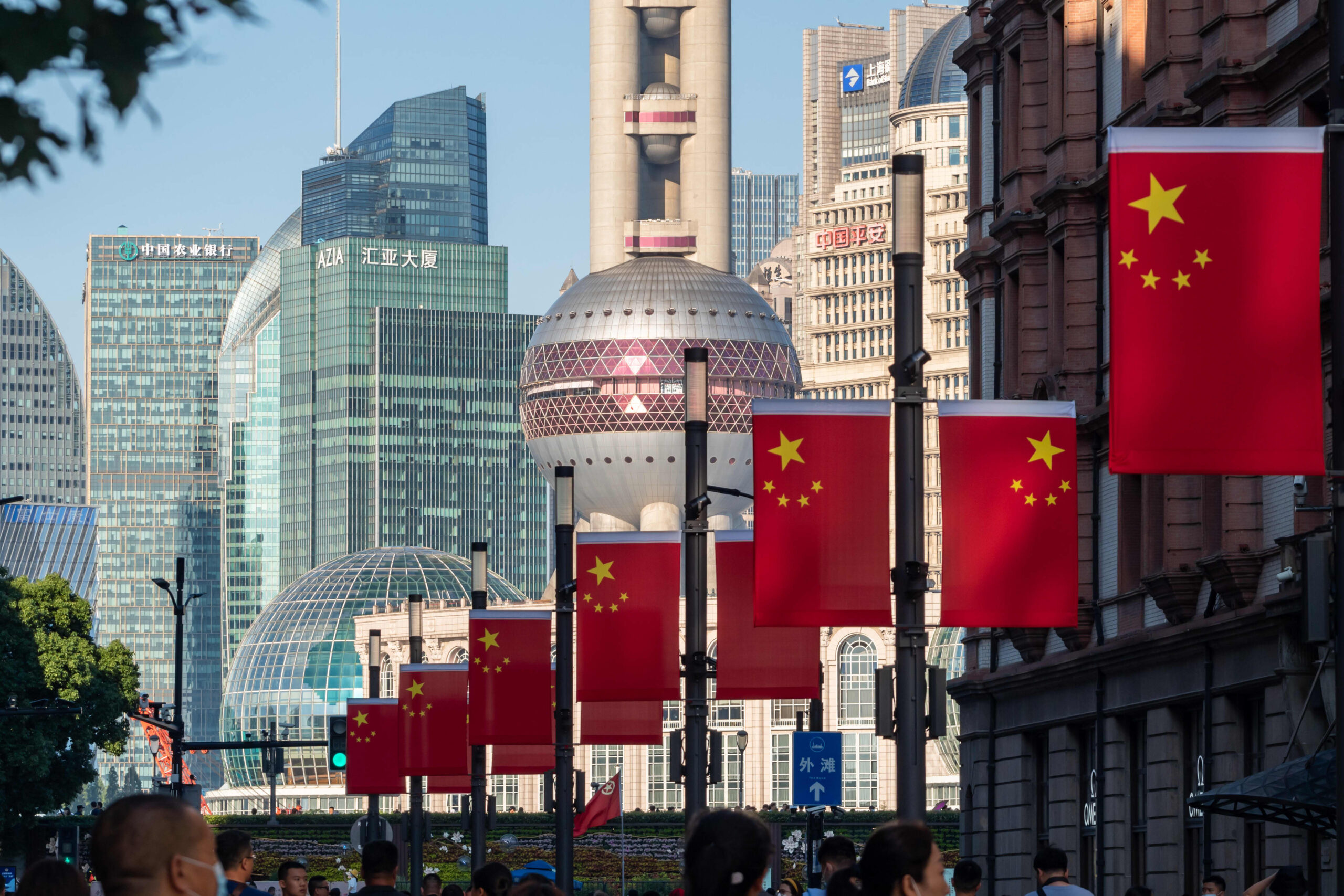China’s regulatory crackdown has wiped billions off tech stocks — here are the risks ahead
Five-starred pink flags line the Nanjing Road pedestrian avenue in Shanghai, China, on June 22, 2021. This 12 months marks the 100th anniversary of the Communist Party of China.

Five-starred pink flags line the Nanjing Road pedestrian avenue in Shanghai, China, on June 22, 2021. This 12 months marks the 100th anniversary of the Communist Party of China.
Costfoto | Barcroft Media | Getty Images
GUANGZHOU, China — Chinese authorities have launched a slew of laws in the previous few months, largely geared toward the tech sector — a transfer that is spooked buyers and wiped out billions of {dollars} in worth from the nation’s web giants.
The legislative onslaught started in November final 12 months when the enormous preliminary public providing of billionaire Jack Ma‘s monetary expertise firm Ant Group was suspended.
(adsbygoogle = window.adsbygoogle || []).push({});
Since then, regulators have launched anti-monopoly legislation centered on the so-called “platform economic system” which broadly refers to web corporations working a wide range of providers from e-commerce to meals supply. Regulations have additionally geared toward bolstering important data security and protection laws.
As a consequence, high-profile expertise corporations have confronted investigations and punishments.
E-commerce titan Alibaba was fined $2.eight billion in an anti-monopoly probe, and China’s largest ride-hailing agency Didi was forced to stop user registrations whereas regulators conduct a cybersecurity review of the company, simply days after its U.S. itemizing.
But with most of the landmark laws handed and visibility growing on the necessities of corporations, buyers are now questioning if it is time to leap into Chinese expertise stocks.
Still, sentiment stays blended.
“I consider the present sentiment towards Chinese tech stocks, at the very least amongst English-speaking buyers, as cut up between two extremes: those that see kinds of regulatory modifications / risks for instance of why they won’t spend money on Chinese stocks versus different buyers who see this as a shopping for alternative in larger high quality Chinese names whose precise future earnings shall be impacted far lower than the magnitude of this 12 months’s sell-off,” Tariq Dennison, wealth supervisor at Hong Kong-based GFM Asset Management, instructed CNBC.
So what are the risks for buyers in Chinese tech stocks ahead?
Regulatory uncertainty
While China has handed a number of marquee legal guidelines, there may be nonetheless a danger of the market being stunned, resulting in uncertainty.
“The wave of latest rules has cascaded and grown since the preliminary response to the Ant Group IPO,” Brian Bandsma, rising markets fairness and Asia-Pacific portfolio supervisor at Vontobel Quality Growth, instructed CNBC. “At the time and into the following weeks, there was no indication this is able to increase in so many various instructions. Each time it appeared like we had been close to the finish, one thing new got here alongside.”
There is a few calmness in the Chinese markets now from the lack of destructive information. However, confidence is extraordinarily fragile now.
Dave Wang
portfolio supervisor, Nuvest Capital
“So I might say it’s dangerous at this level to wager that the worst is behind us,” he stated.
Last week, Chinese technology stocks saw a huge one-day rally. Funds beneath Ark Investment Management, which is based by Cathie Wood, bought some shares of JD.com final week. After the rally, tech stocks fell once more on subsequent buying and selling days, highlighting the cautious method from buyers cautious of regulatory risks.
“Policy uncertainty stays [in] the forefront. There is a few calmness in the Chinese markets now from the lack of destructive information. However, confidence is extraordinarily fragile now,” Dave Wang, portfolio supervisor at Nuvest Capital, instructed CNBC.
“Thus, if the Chinese authorities proceed to launch bits and items of destructive information and worse one other sudden coverage, we may see a renewed promote off.”
Geopolitics
Chinese expertise corporations have been caught in the geopolitical battle between the U.S. and China since the administration of President Donald Trump.
Gaming giant Tencent, TikTok owner ByteDance and telecommunications firm Huawei, had been all dragged into geopolitics and that is still a danger for Chinese expertise corporations.
One danger is “overseas governments imposing extra sanctions on Chinese stocks,” stated Dennison from GFM Asset Management.
Meanwhile, Chinese corporations listed on U.S. inventory exchanges may face stricter itemizing and auditing guidelines.
Gary Gensler, the chairman of the U.S. securities and Exchange Commission (SEC) told Bloomberg this week that Chinese corporations already listed in the U.S. want to raised inform buyers about regulatory and political risks.
Many U.S.-listed Chinese corporations together with Alibaba and Baidu carried out secondary listings in Hong Kong to hedge in opposition to these risks.
Change to enterprise fashions
There are additionally considerations that expertise corporations must change their enterprise practices ahead of landmark insurance policies coming into impact. Such rules embrace these geared toward information assortment practices, on-line content material and the use of algorithms to focus on customers.
When Alibaba was fined in an anti-monopoly probe earlier this 12 months, regulators stated they had been investigating a observe that forces retailers to decide on one among two e-commerce platforms, as a substitute of permitting them to work with each. China’s market regulator stated the observe stifles competitors.
“Companies will definitely need to be rather more cautious about sure actions,” stated Bandsma from Vontobel.
“Acquisitions, particularly of companies which may be perceived as a aggressive risk, shall be scrutinized extra. Exhibiting pricing energy, particularly with small retailers or shoppers, shall be harder to implement.”
But it is nonetheless unclear whether or not this might have a significant influence on enterprise fashions, and in the end revenue.
Where does this depart China’s tech giants?
Short time period velocity bumps could also be ahead for China’s web corporations.
Ultimately, analysts stated, these tech giants — which have a historical past of rapidly adapting to new regulatory environments — will have the ability to deal with the slew of latest guidelines.
“The extra diversified giants know how one can deal with new information rules higher than anybody, and know-how to pivot to other ways of monetizing their customers than anybody,” Dennison stated. “On the upside, extra Chinese guidelines will additional shield Chinese tech corporations from any aspiring overseas competitors.”
Such rules may additionally present a possibility to long- and short-term buyers.
“There are a variety of corporations on extraordinarily robust footing and may play the lengthy sport. Regulations are broad-based and in the end will improve the boundaries to entry too. Investors who’ve affected person capital will profit vastly in selecting the proper ones,” Nuvest Capital’s Wang stated, referring to long-term capital.
“Professional merchants who are a lot shorter time period also can search to profit on the volatility and volatility premiums that include it.”
One knowledgeable warned, nonetheless, that the regulatory uncertainty may imply overseas capital is just not as keen to fund Chinese expertise corporations. SoftBank CEO Masayoshi Son stated this month that the firm would reduce on new investments in China.
“Now, what would that imply when it comes to the continued sustained competitiveness of the Chinese tech business, and even different industries, if overseas capitals are turning into increasingly more conscious of the risks, that shall be concerned, after which they are pulling again now?” Charles Mok, founding father of Tech For Good Asia, a tech advocacy group, instructed CNBC’s “Beyond the Valley” podcast.
“I might suppose that that is a matter of concern in the long run.”



